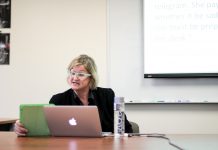The UW Women in Mathematics (WiM) Committee held a panel discussion on Friday, March 8, from 11:30 a.m. to 12:30 p.m. in MC. A light lunch was provided with sandwiches and cookies. The event aimed to explore the various challenges female group leaders have faced in their academic journey and how they overcame them. The panelists include Barbara Csima, Ghazal Geshnizjani, Christiane Lemieux, Yuying Li and Tal Rabin.
Each panelist was asked questions regarding their biggest challenges as a woman in math and what kept them motivated. Csima, professor of pure mathematics and the president-elect of the Canadian Mathematical Society (CMS), expressed that her biggest challenge was that she didn’t realize there was a problem. She said, “when I went into math, I was naive and I didn’t realize how hard it is to balance things like kids and work.” She cut herself some slack and reduced her expectations of herself so she could balance her life. When asked why she decided to further her career and become CMS president-elect, she said that “there comes a point in your life when being a professor is about having the responsibility to do more and bringing researchers together.” Csima explained that she would advise women in math to have a backup plan if they are running out of time.
Geshnizjani, faculty at Perimeter Institute and former WiM chair, grew up in Iran and came to the United States to do her PhD. She found it difficult to balance her work and personal life, and said, “the thing that helped me the most was that I chose my family and realized to accept the difficulties.”
For Li, professor at the Cheriton school of computer science and former associate dean of graduate studies, the biggest challenge was moving from China to Canada and adjusting to that change. “I went from an undergraduate degree in applied math in China, but when I got to Canada, I wanted to do computer science, which made me lose confidence in myself,” she said. Coming to terms with what she has accomplished and finding her strengths helped her to find confidence. Li suggested that women in math should love to learn and stay grounded, but at the same time, explore and make changes.
The greatest challenge for Rabin, professor at UPenn, fellow of association of computing machinery and the international association for cryptologic research, was that she had no female role models. “I didn’t really have anyone to look up to or someone I could express my problems to,” she said. Rabin talked about how she still doubts herself and thinks her colleagues for the past 20 years are better than her. She said that, “I try to focus on the things where I have an edge on other people, but sometimes the success feels underserved even though I gave it my all.” Rabin suggested women in math should love what they do, and should do it as long as people are willing to support you.
Lemieux, professor at the department of statistics and actuarial science and associate dean of operations and academic, said it was challenging balancing a career and three kids. “I would constantly compare myself to people who didn’t have kids and how they had more time for their careers,” she said. To overcome this problem, she realized it was her choice to be balanced and not stretch herself too thin. Some challenges Lemieux has faced in her career include being excluded from informal meetings with male leaders. She said, “male leaders would go and have beers with each other to talk about work and I didn’t know this would be happening.” Lemieux suggested that women in math should adapt to new things. She said that, “you might discover that you like leadership roles and go into that.”






























